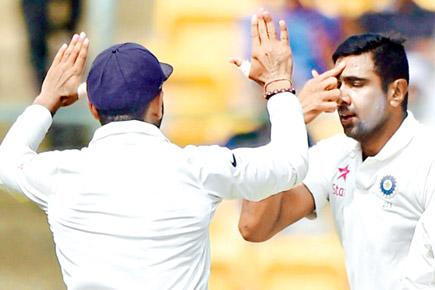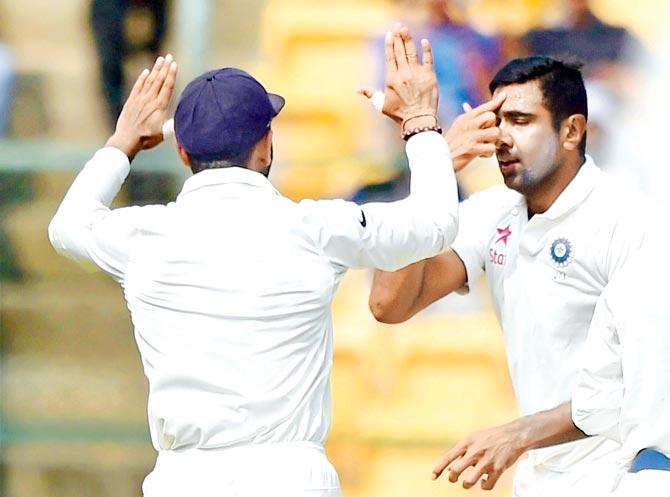Why just restrict sledging to one or two categories? Anything that has the power to genuinely hurt another person should be off limits. But, where is this list and who decided on it?

 In a tit-for-tat act, R Ashwin points to his forehead after dismissing Mitchell Starc during the second Test in Bangalore. Pic/PTI
In a tit-for-tat act, R Ashwin points to his forehead after dismissing Mitchell Starc during the second Test in Bangalore. Pic/PTI
ADVERTISEMENT
"As long as it's not racial (sic) or homophobic or any of that other stuff and it's into him trying to put him off his game, I don't particularly have a problem with that."
This was former Australian fast bowler Stuart Clark's summation of the ugly interactions that marred an otherwise enthralling Bangalore Test. Thank you for that naive and useless attempt at defusing the sledging controversy but as far as providing a template for cricket to rediscover it's noble roots, it is about as useless as Mitch Marsh batting at number six! Well, perhaps that is unfair on Clark — at least his comments will take longer to dissect than Marsh's average Test innings.
In a climate where the ICC have completely abrogated their responsibilities as custodians of the Spirit of Cricket (now there's another utterly useless phrase that has zero credibility amongst international cricketers), Clark's comments assume that at some point, all teams (or the ICC) agreed to a set of rules that placed racist or homophobic insults in a special category all of their own. Why? Who agreed that it is only racism or homophobia that is off limits to a bunch of highly paid professionals who make a mockery of what it means to behave appropriately in a very public workplace?
Surely anything that has the power to genuinely hurt another person should be off limits. Why just restrict sledging to two special categories? What's on the "allowable list of insults" list? Mental health, depression, sexual perversions, bestiality, birthmarks, bulimia, anorexia, unusual physical features? Where is this list, who decided on it?
In Australian club cricket for example, where it is increasingly rare that someone is sledged on the basis of their race, religion or sexuality, it is much more common to hear deeply hurtful insults about someone's lack of courage, their wife/partner's apparent infidelities or their inferior human qualities. Going by Clark's Law, so long as it puts someone off their game, that is acceptable? Why did Glenn McGrath get so riled up when Ramnaresh Sarwan made a tasteless comment about McGrath's wife (who was gravely ill at the time)? This wasn't racist or homophobic. What's more, it was in response to a comment that McGrath allegedly made to Sarwan that attempted to humiliate him and Brian Lara using sexual innuendo. So why did the Australians get so hot under the collar? Not racist, not homophobic and trying to put someone off their game. Not acceptable? In poor taste (pardon the pun!)?
Maybe, it transgressed the "any of that other stuff" reference. What exactly constitutes "other stuff"? Who wrote the rule book and who agreed to it? Racism, homophobia or any of that other stuff basically covers every insult that someone could take offence to. Where is that line?
What if someone was just going through a very private marriage break-up and they were sledged about that issue? What if someone was feeling suicidal and had their mental health questioned? What if someone had a supposed weakness against the short ball and was goaded into playing the hook shot to prove their courage?
It wasn't that long ago when both these teams wore black armbands and promised us that cricket had changed forever after the Phillip Hughes accident. How quickly we forget.
For the ICC to press no charges just underscores their own lack of courage. Coming so soon after the heart-wrenching sentimentality of the Phil Hughes dedications whenever someone passed a numerical milestone and the genuine grief that shook the global cricket community, Mitchell Starc's threatening gesture to Abhinav Mukund was scarcely believable, as was R Ashwin's childish response a day later. Niroshan Dickwella gets a one game suspension for looking disgusted with a poor umpiring decision recently but incidents like that don't warrant further investigation? When the next incident happens, the match referee looks at their "clean" records and decides not to report them. And so the cycle continues.
And therein lies the problem with a simplistic statement like Clark's — unless you go to the ridiculous lengths of drawing up a list approved by both teams before the toss, based on individual sensitivities, how can you police inappropriate sledging?
 Subscribe today by clicking the link and stay updated with the latest news!" Click here!
Subscribe today by clicking the link and stay updated with the latest news!" Click here!







